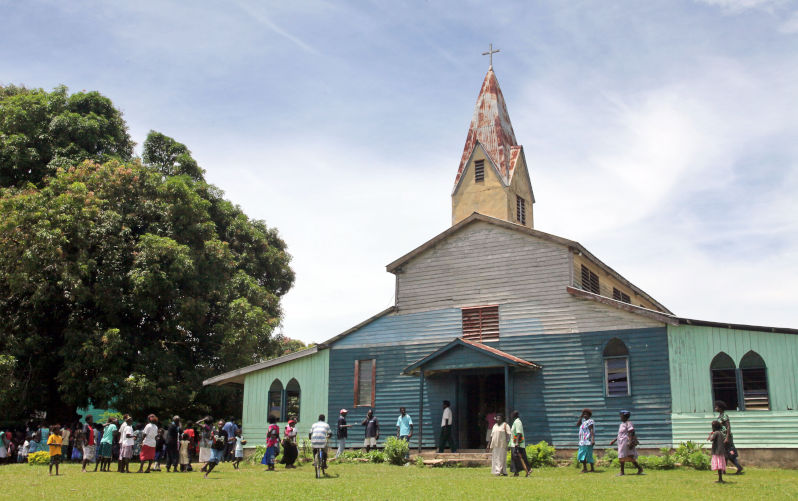Keeping promises to the people of Bougainville
October 31, 2024
As anger boils among younger generations for allowing themselves to be conned by Australia on independence, a diplomacy of promise-keeping is needed to prevent the fragmentation of Bougainville, followed by the fragmentation of Papua New Guinea, writes John Braithwaite.
In 2019, Bougainville finally had an independence referendum which was provided for in the peace agreement that ended the 1988-98 civil war.
That war started with environmental and other grievances over a Conzinc Rio Tinto Australia mine.
97.7 per cent of Bougainvilleans voted for independence in preference to increased autonomy in a free and fair referendum. It now seems unlikely that the Papua-New Guinea Parliament will ever ratify the referendum decision. The peace agreement requires it to do so for independence to proceed.
Former Irish Prime Minister, Bertie Ahern, oversaw the integrity of the referendum. He reported to the UN Secretary-General and the people of Bougainville that the vote was so overwhelming for independence in a UN-sanctioned referendum that the international community would ensure that Bougainville became the world’s next independent country.
All four of Bougainville’s elected Presidents of the past 20 years thought this too. They said they had always believed Australian Foreign Minister Alexander Downer had assured Bougainville negotiators that if the vote was overwhelming, the international community would not tolerate roadblocks to independence.
Australia, in fact, has always been extremely tolerant of disrespect for the referendum outcome.
Among the younger generation, anger simmers in Bougainville against Downer and Australia for coming up with the foolish idea of ‘building up expectations’ by a referendum that Australia and PNG had no intention of honouring. More worryingly, anger boils against their political leaders for allowing themselves to be conned by Australia on independence, just as the older generation were conned by Australia over benefits the Rio Tinto mine would bring to Bougainvilleans.
The young say they smell a rat. That rat is big Australian miners empowered by the denial of independence to resume destruction of Bougainville’s rivers and plunder of its resources.
We Australians could stand up to say they we are not that rat. Australia was genuine in proposing the independence referendum and it genuinely stands for implementation of the will of the people that the UN Security Council authorised the people of Bougainville to assert. Australia could say that, but it does not.
Some Australian analysts are understandably concerned that if Bougainville gets independence, PNG might fragment. This is exaggerated and speculative. Other parts of PNG have never gone close to securing Security Council endorsement for an independence referendum. Even if they had one, they would not achieve 98 per cent consensus. If the PNG parliament declines to ratify the Bougainville referendum decision, Bougainville likely will declare independence unilaterally. PNG will not secure the resources from Australia this time to sail across in its navy to put down a Bougainville rebellion, as it unsuccessfully sought to do during the 1988-98 war.
Then other renegade PNG provinces could allege that you can unilaterally declare independence and the PNG state cannot stop you. This could not be said if PNG agrees to Bougainville’s independence pursuant to a UN-ratified referendum decision.
Fear of fragmentation is a genuine fear, but it is a shoe on the opposite foot to the shaky diplomatic footing of defer, deny and decline independence.
My Working Paper - Peaceful Independence for Bougainville - argues that Australian diplomacy has been inept on Bougainville. It was part of a broader ineptitude of diplomatic innovation during the Howard-Downer era that advocated deferred referenda in Timor-Leste and New Caledonia, as well as Bougainville. It was hardly clever innovation because, as we see in New Caledonia today, it just kicked the problem down the track. It returns to bite the region today. Fortunately, Indonesia opted for a non-deferred referendum that it promptly ratified rather than opting for the deferred referendum proposed by John Howard.
The rest of the world was unimpressed by the South Pacific fad for deferred referenda funded in bad faith. Howard-Downer packaged the innovation as part of Australian regional genius of the era of the Arc of Instability around Australia.
What makes me think that this is heading Australia toward trouble? And what makes me suspect that President Toroama of Bougainville will declare independence if PNG declines to ratify their referendum?
If President Toroama even implies that he could accept a PNG decision to deny independence, he would be a dead man walking, politically at least. No Bougainville leader could be elected as the next President of Bougainville after surrendering to denial of a 98 per cent vote of their people.
The old guard of Bougainville leaders must also keep in mind a darker danger. This is some future aspiring leader with authoritarian intent who arms his followers to overthrow Bougainville’s democracy along with its elected leader by force of arms. These combined electoral and warlord risks mean that Bougainville presidents will declare independence if PNG and Australia push their backs to the wall.
More than ever, Bougainvilleans look for leaders who keep their promises, whether they are from the United Nations, Australia, New Zealand, PNG or Bougainville. Leaders from all these places did some great things during the Bougainville peace process, but also some things that now look foolish because implementation of a peace has been given one kick too many down a road of broken promises. A narrative of the broken promise is a recurrent proximate factor in the onset of war in my Peacebuilding Compared research on 78 armed conflicts.
A diplomacy of promise-keeping is needed to prevent the fragmentation of Bougainville, followed by the fragmentation of PNG.
Read John Braithwaite's full working paper

